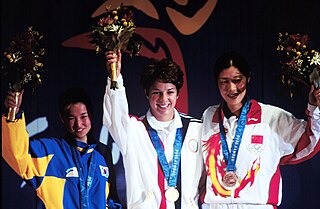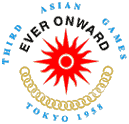
The 1988 Summer Olympics, officially known as the Games of the XXIV Olympiad and commonly known as Seoul 1988, was an international multi-sport event held from 17 September to 2 October 1988 in Seoul, South Korea. 159 nations were represented at the games by a total of 8,391 athletes. 237 events were held and 27,221 volunteers helped to prepare the Olympics.

Benjamin Sinclair Johnson, is a Canadian former sprinter. During the 1987–88 season he held the title of the world's fastest man, breaking both the 100m and the 60m indoor World Records. He won the 100 metres at the 1987 World Championships in Athletics; and at the 1988 Summer Olympics, but was disqualified for doping and stripped of the gold medal; and later he also lost most of the other medals he had achieved while being doped - with anabolic steroids. He was the first man who beat 9.9 and 9.8 seconds.

The 2004 Summer Olympics, officially known as the Games of the XXVIII Olympiad, were a summer multi-sport event held in Athens, the capital city of Greece, from 13 to 29 August 2004. A total of 10,625 athletes from 201 countries represented by National Olympic Committees participated in these games, competing in 301 events in 28 sports. Kiribati and Timor Leste competed for the first time in these Olympic Games.

The 2000 Summer Olympics, officially known as the Games of the XXVII Olympiad, were a summer multi-sport event held in Sydney, New South Wales, Australia, from 15 September to 1 October 2000. A total of 10,651 athletes from 199 nations represented by National Olympic Committees (NOCs) competed in 300 events in 28 sports.
The 1996 Summer Olympics, officially known as the Games of the XXVI Olympiad, were a summer multi-sport event held in Atlanta, Georgia, United States from 19 July to 4 August 1996. A total of 10,318 athletes from 197 National Olympic Committees (NOCs), competed in 271 events in 26 sports.
The 1992 Summer Olympics medal table is a list of National Olympic Committees and two non-NOC teams ranked by the number of medals won during the 1992 Summer Olympics, held in Barcelona, Catalonia, Spain, from July 25 to August 9, 1992. A total of 9,356 athletes from 169 countries participated in these games, competing in 257 events in 28 sports.

The 1972 Summer Olympics, officially known as the Games of the XX Olympiad, took place in Munich, West Germany, from 26 August through 11 September 1972. A total of 7,134 athletes from 121 National Olympic Committees (NOCs) competed in 195 events from 23 sports.
This is the full table of the medal table of the 1968 Summer Olympics in Mexico City.
This is the full table of the medal table of the 1964 Summer Olympics in Tokyo.
The 1960 Summer Olympics medal table is a list of National Olympic Committees ranked by the number of medals won during the 1960 Summer Olympics, held in Rome, Italy from August 25 to September 11, 1960.
This is the full table of the medal table of the 1956 Summer Olympics in Melbourne, Australia and Stockholm, Sweden.
This is the full table of the medal table of the 1952 Summer Olympics held in Helsinki, Finland.
This is the full table of the medal table of the 1920 Summer Olympics which were held in Antwerp, Belgium.
This is the full medal table of the 1956 Winter Olympics, which were held in Cortina d'Ampezzo, Italy. These rankings sort by the number of gold medals earned by a country. The number of silvers is taken into consideration next and then the number of bronze. If, after the above, countries are still tied, equal ranking is given and they are listed alphabetically. This follows the system used by the IOC, IAAF and BBC. Poland, and Japan won their first Winter Olympic Medal at these games. Japan's medal was also the first Winter Olympics Medal for an Asian nation.

The 1958 Asian Games, officially the Third Asian Games and commonly known as Tokyo 1958, was a multi-sport event held in Tokyo, Japan, from 24 May to 1 June 1958. It was governed by the Asian Games Federation. A total of 1,820 athletes representing 20 Asian National Olympic Committees (NOCs) participated in the Games. The program featured competitions in 13 different sports encompassing 97 events, including four non-Olympic sports, judo, table tennis, tennis and volleyball. Four of these competition sports – field hockey, table tennis, tennis and volleyball – were introduced for the first time in the Asian Games.
The men's 100 meters at the 1988 Summer Olympics in Seoul, South Korea saw world champion Ben Johnson of Canada defeat defending Olympic champion Carl Lewis of the United States in a world record time of 9.79, breaking his own record of 9.83 that he had set at the 1987 World Championships in Rome. Two days later, Johnson was stripped of his gold medal and world record by the International Olympic Committee (IOC) after he tested positive for stanozolol. The gold medal was then awarded to the original silver medalist Lewis, who had run 9.92. On 30 September 1989, following Johnson's admission to steroid use between 1981 and 1988, the IAAF rescinded his world record of 9.83 from the 1987 World Championship Final and stripped Johnson of his World Championship gold medal, which was also awarded to Lewis, who initially finished second. This made Lewis the first man to repeat as Olympic champion in the 100 metres.

An all-time medal table for all Paralympic Games from 1960 to 2020. The International Paralympic Committee does not publish all-time tables, and publishes unofficial tables only per single Games. This table was thus compiled by adding up single entries from the IPC database. This medal table also includes the medals won on the 1992 Summer Paralympics for Intellectualy Disabled, held in Madrid, which also organized by the International Coordination Committee (ICC) and same Organizing Committee (COOB'92) that made the gestion of the 1992 Summer Paralympics held in Barcelona and also part of same event. But the results are not on the International Paralympic Committee 's (IPC) database.
The Olympic medal table is a method of sorting the medal placements of countries in the modern-day Olympics and Paralympics. The International Olympic Committee (IOC) does not officially recognize a ranking of participating countries at the Olympic Games. Nevertheless, the IOC does publish medal tallies for information purposes, showing the total number of Olympic medals earned by athletes representing each country's respective National Olympic Committee. The convention used by the IOC is to sort by the number of gold medals the athletes from a country have earned. In the event of a tie in the number of gold medals, the number of silver medals is taken into consideration, and then the number of bronze medals. If two countries have an equal number of gold, silver, and bronze medals, they are ordered in the table alphabetically by their IOC country code.

The following medal table is a list of National Olympic Committees (NOCs) and one non-NOC team ranked by the number of gold medals won by their athletes during the 2016 Summer Olympics in Rio de Janeiro, from 5 to 21 August 2016.
The 1988 Summer Paralympics medal table is a list of National Paralympic Committees (NPCs) ranked by the number of gold medals won by their athletes during the 1988 Summer Paralympics, held in Seoul, South Korea, from October 15 to 24, 1988.







